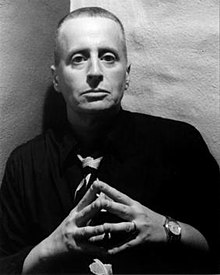Leslie Feinberg
| Leslie Feinberg | |
|---|---|

Feinberg in 1997, in a photograph by Ulrike Anhamm
|
|
| Born |
September 1, 1949 Kansas City, Missouri, U.S. |
| Died | November 15, 2014 (aged 65) Syracuse, New York, U.S. |
| Occupation | Author, activist |
| Nationality | American |
| Spouse | Minnie Bruce Pratt |
| Website | |
| transgenderwarrior |
|
Leslie Feinberg (September 1, 1949 – November 15, 2014) was an American, butch lesbian and transgender activist, communist, and author. Feinberg authored Stone Butch Blues in 1993. Her writing, notably Stone Butch Blues and her pioneering non-fiction book, 1996's Transgender Warriors, laid the groundwork for much of the terminology and awareness around gender studies and was instrumental in bringing these issues to a more mainstream audience.
Feinberg's first novel, the 1993 Stone Butch Blues, won the Lambda Literary Award and the 1994 American Library Association Gay & Lesbian Book Award. While there are parallels to Feinberg's experiences as a working-class dyke, the work is not an autobiography. Her second novel, Drag King Dreams, was released in 2006.
Her nonfiction work included the books Trans Liberation: Beyond Pink or Blue in 1998 and Transgender Warriors: Making History from Joan of Arc to Dennis Rodman in 1996. In 2009 she released Rainbow Solidarity in Defense of Cuba - a compilation of 25 journalistic articles.
In Transgender Warriors, Feinberg defines "transgender" as a very broad umbrella, including all "people who cross the cultural boundaries of gender" - including butch dykes, passing women (those who passed as men only in order to find work or survive during war), and drag queens.
Feinberg was a member of the Workers World Party and a managing editor of Workers World newspaper.
Feinberg's writings on LGBT history, "Lavender & Red," frequently appeared in the Workers World newspaper. Feinberg was awarded an honorary doctorate from Starr King School for the Ministry for transgender and social justice work.
Feinberg described herself as "an anti-racist white, working-class, secular Jewish, transgender, lesbian, female, revolutionary communist." Feinberg stated in a 2006 interview that her preferred pronouns varied depending on context:
...
Wikipedia
